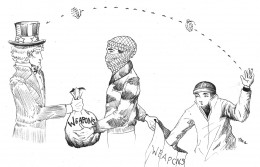
An article in Monday’s New York Times reported that many of the weapons being shipped into Syria to aid rebels in their fight against the country’s President, Bashar al-Assad, were flowing to Jihadist rebel groups. Some of these groups even have ties to al-Qaida.
The United States has so far only facilitated arms shipments, providing intelligence to the countries providing weapons — Qatar and Saudi Arabia, among others — rather than directly supplying weapons to the rebel groups themselves. But outsourcing arms shipments appears to have failed; the wrong groups are getting arms. So shouldn’t President Obama step in and start giving American weapons to the other, secular groups that the United States supports?
The centerpiece of United States foreign policy since the end of World War II has been that line of thinking. If there is a foreign conflict, surely America should get involved, the thinking goes. And if we pick the group whose ideology and goals appear similar to ours, surely that group will, once in power, show gratitude to its benefactor by having strictly pro-American foreign policy, allowing American military bases on its land and welcoming American corporations into the country with open arms.
This policy of partisan support has been applied frequently and across the globe, from South America to the Middle East to Asia. We’ve trained rebels in Nicaragua and Guatemala, armed the mujahidin in Afghanistan to fight the Soviet occupation of the country during the Cold War and, more recently, trained and assisted rebels fighting Muammar Gaddafi.
The outcome of those actions has been, for lack of a better word, disastrous. Time after time, the rebels the United States thought were friendly to its causes came to power and, lo and behold, felt no obligation to America.
Guatemala and Nicaragua quickly unseated the American installed leaders; the American-backed Shah in Iran exercised a brutal rule before being deposed and replaced by radically anti-American rulers; and all signs in Libya point toward the government being, if not anti-American, in no way beholden to its erstwhile ally.
These examples are but a few out of many. But the point is clear: America’s track record is terrible. No matter how pro-American the groups say they are during the conflict, it’s anyone’s guess how they’ll act post-conflict.
To gain the support of the most powerful country on the planet, of course these groups will say whatever is necessary. Rebel groups figured this out a long time ago, and it’s been working ever since.
Some factions became overtly anti-American following their victory: The mujahidin eventually became the Taliban, the most infamous example of this.
Even when the groups we assist don’t turn against us, they rarely become just U.S. policy surrogates. Resistance fighters may be grateful to their benefactors, but they fight for their country’s liberation, not the replacement of a native despot with a foreign puppeteer.
Simply put, they feel their policies should be a reflection of their own country’s needs and wants, not another’s.
The results of intervention, direct or not, cannot be figured out by some mathematical formula; nor can the U.S. know the true intentions of any faction. Often, as in Iraq or Libya, the groups are just as divided internally as the country is externally — the pro-American leader we support may be dead the next.
In Syria, jihadist groups are getting arms. Islamists may have carried out 9/11 and be notorious tramplers of human rights, but they are fighting a brutal dictator just like the other rebel groups.
Maybe supporting secular rebel factions would help the U.S. Maybe it wouldn’t. But abstaining from the conflict may be just as likely to produce a favorable outcome as intervention would.
No one knows the counter-factual. But we do know this: not getting involved will not cost us millions of dollars or any lives. Intervention has done more harm than good so far. It’s best to let this conflict play out on its own time.


